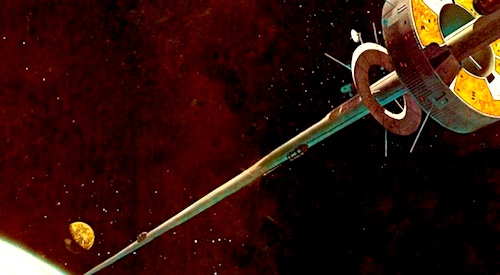By Joe Bendel. In the 1970s, Arthur C. Clarke predicted that you would read this review. It was all a matter of science and he was one of the best at putting the “s” in “sf.” Recently, Danny Boyle’s Steve Jobs opened with Clarke’s outlandish prophecy that personal computers would one day become commonplace and now a new documentary prominently features Clarke’s conception of a space elevator, and the 1979 novel The Fountains of Paradise in which they reshape our world. Of course, his predictions regarding computers have already come to pass, but the space elevator’s time has not yet come. Miguel Drake-McLaughlin & Jonny Leahan profile the scientists and entrepreneurs trying to realize the not-impossible space elevator dream in Sky Line, premiering at this year’s DOC NYC.
Sky Line does a super job explaining the space elevator idea for layman, which in itself is probably a significant contribution to the discourse. Essentially, it is like a tether ball. Some kind of node is attached to the terra firma by an enormous chord that becomes taut due to the Earth’s rotation. In theory, we should be able to zip cargo and space vessels up that line much more economically than by using dirty old rockets. The problem is we do not quite have strong enough material for the cable yet, but we are close.
The space elevator seems tantalizingly doable, but NASA has not exactly taken a leadership role in its development. It has largely been left to private academic and entrepreneurial concerns. Some of the various space elevator proponents share what could be described as a friendly rivalry, whereas others clearly do not. Michael Laine, the founder of LiftPort seems to a real feather-ruffler, but he certainly put his money where his mouth was. He is also probably the film’s best interview subject.
There is a lot of interesting science made understandable in Sky Line, but probably the coolest stuff in the film are the excerpts from the abridged Fountains of Paradise LP read by Clarke himself and all the striking retro Chesley Bonestell-style concept art. Unfortunately, the film suffers from the lack of a clear dramatic arc, but there is not a lot Drake-McLaughlin and Leahan could do about that, short of rolling up their sleeves and brainstorming a breakthrough in carbon nanotube technology.

Arguably, there is even more urgency to the drive to realize the space elevator concept than Sky Line suggests. Right now, the American space program has no manned space travel capacity. We are entirely dependent on Russia if we want to hitch a ride to the International Space Station. Obviously, this is a highly problematic situation. Regardless, Sky Line does a nice job explaining the concepts and benefits of the space elevator, but it doesn’t quite fire up the audience the way proponents were probably hoping. However, it is highly informative, which is certainly laudable. Recommended for space program boosters and those interested in popular science, Sky Line screens this Sunday (11/15) and the following Wednesday (11/18) at the IFC Center, as part of DOC NYC 2015.
LFM GRADE: B
Posted on November 13th, 2015 at 12:42pm.